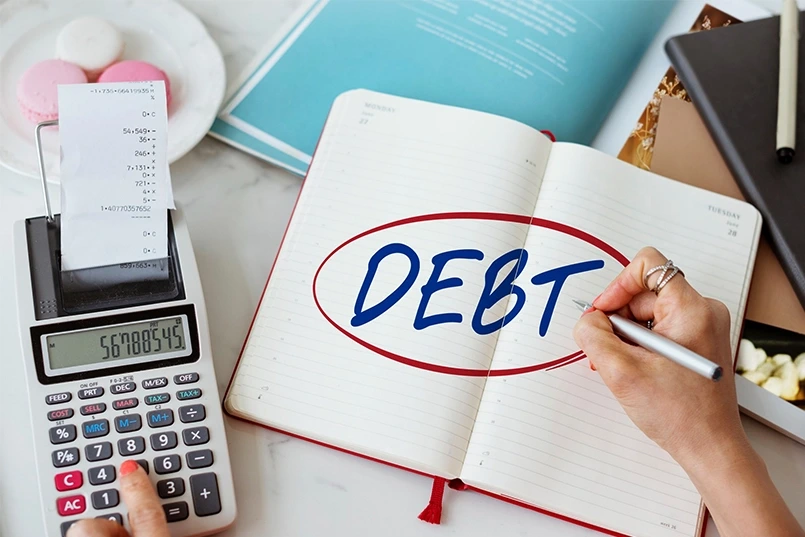Table of Contents
Are you feeling overwhelmed by multiple debts and constantly struggling to keep up with payments? If so, debt consolidation may be the solution you’ve been looking for. Debt consolidation is a financial strategy that allows you to combine all of your debts into a single loan with one monthly payment. This can make it easier to manage your debts and potentially lower your overall interest rates.
Debt consolidation is a financial strategy that many people consider when they find themselves in a difficult financial situation. But is debt consolidation a good idea?
Today, we are going to explore why debt consolidation can be a good idea and how it can help you get on the path to financial freedom
Let’s take a closer look at what debt consolidation is, the pros and cons, and ultimately, whether it is the right choice for you.
What Is Debt Consolidation?

Debt consolidation is the process of combining multiple debts into one single loan. This can be done through a variety of methods, such as taking out a personal loan to pay off credit card debt, or working with a debt consolidation company to negotiate lower interest rates with creditors.
The types of debt that can be consolidated include credit card debt, personal loans, medical bills, and more. By consolidating your debts, you can often lower your monthly payments and potentially save money on interest over time.
Pros Of Debt Consolidation
There are several benefits to debt consolidation. One of the main advantages is the potential for lower interest rates. By consolidating your debts into one loan, you may be able to secure a lower interest rate than what you are currently paying on your various debts. This can save you money in the long run and make it easier to manage your monthly payments
Another advantage of debt consolidation is the simplified payment process. Rather than dealing with multiple creditors and due dates, you will only have one monthly payment to worry about. This can make it easier to stay on top of your payments and avoid late fees.
Additionally, debt consolidation can have a positive impact on your credit score. By paying off your debts in a timely manner through a consolidation loan, you may see an improvement in your credit score over time. This can make it easier to qualify for loans and other financial products in the future.
Lastly, debt consolidation can help you pay off your debt faster. By making consistent monthly payments towards a consolidation loan, you can work towards becoming debt-free sooner than if you continued to pay off multiple debts separately.
Cons Of Debt Consolidation
While debt consolidation offers many benefits, there are some drawbacks to consider as well. One potential downside is the risk of incurring more debt. If you use a consolidation loan to pay off your credit card debt, it can be tempting to continue using your credit cards and accumulate more debt. This can put you in an even worse financial situation than before.
Another con of debt consolidation is the potential for increased overall interest payments. While you may be able to secure a lower interest rate with a consolidation loan, extending the repayment period can result in paying more interest over time. It’s important to carefully consider the terms of the consolidation loan and how it will impact your total interest payments.
Additionally, debt consolidation can have a short-term impact on your credit score. Opening a new loan or credit account can temporarily lower your credit score, so it’s important to consider how this may affect your financial goals.
How Mortgage Brokers Rip You Off And What You Can Do About It
How Does Debt Consolidation Work?

There are a few different methods for consolidating debt, but the most common option is to take out a loan to pay off all of your existing debts. This can simplify your payments and potentially save you money in interest fees.
Essentially, you take out a new loan, often at a lower interest rate than your current debts, to pay off all of your existing debts. This leaves you with just one monthly payment to make, simplifying your finances and making it easier to stay on top of your payments.
There are several ways to consolidate your debts, including taking out a personal loan, using a balance transfer credit card, or utilizing a debt consolidation program. Each option has its own pros and cons, so it’s important to carefully consider which one is best for your individual financial situation.
Is Debt Consolidation A Good Idea?
So, is debt consolidation a good idea? The answer depends on your individual financial situation. Before deciding if debt consolidation is right for you, consider the following factors:
- Can you afford the monthly payments on a consolidation loan?
- Are you committed to avoiding future debt and improving your financial habits?
- Do you understand the terms and potential costs associated with debt consolidation?
Debt consolidation may be a good idea if you are struggling to manage multiple debts, have a high interest rate on your current debts, and are committed to becoming debt-free. However, it’s important to weigh the pros and cons and consider all of your options before moving forward with debt consolidation.
If debt consolidation is not the right choice for you, there are alternatives to consider. These may include debt management programs, debt settlement, or working directly with creditors to negotiate lower interest rates or payment plans.
Tips For Considering Debt Consolidation
Debt consolidation can be a helpful tool for getting your finances back on track and reducing your debt burden.
By following these tips and carefully considering your options, you can make an informed decision about whether debt consolidation is the right choice for you.
1) Assess Your Current Financial Situation
Before diving into debt consolidation, it’s important to take a good look at your finances. Calculate how much debt you have, the interest rates you are paying, and your monthly payments. This will give you a better understanding of your financial situation and help you determine if debt consolidation is the best option for you.
2) Understand The Different Debt Consolidation Options
There are several ways to consolidate your debt, such as personal loans, balance transfer credit cards, or a home equity loan. Each option has its pros and cons, so it’s essential to do your research and understand the terms and conditions of each before making a decision.
3) Consider The Potential Savings
Debt consolidation can help reduce your monthly payments and interest rates, potentially saving you money in the long run. However, it’s important to calculate the total cost of the new loan, including any fees or charges, to ensure that you are actually saving money by consolidating your debt.
4) Create A Repayment Plan
Once you have consolidated your debt, it’s essential to create a repayment plan to ensure that you stay on track and pay off your debt as quickly as possible. Make a budget, cut expenses where necessary, and set aside a specific amount each month to pay off your debt.
5) Seek Professional Advice
If you are unsure about whether debt consolidation is the right option for you, consider seeking advice from a financial advisor or credit counselor. They can help you understand your options, create a plan to pay off your debt, and provide valuable guidance throughout the process.
Conclusion
Debt consolidation can be a useful tool for managing debt and improving your financial situation, but it’s not the right choice for everyone, it’s important to carefully weigh the pros and cons. Before making a decision, take the time to thoroughly review the benefits and drawbacks of debt consolidation.
By understanding how debt consolidation works and taking the necessary steps to consolidate your debts responsibly, you can take control of your finances and work towards a debt-free future. and seek professional advice if needed.

Ritika Sharma
As a writer, editor, SEO strategist, and supporter of the Dazonn Assist, I find more joy in writing content about Bussiness development and outsourcing services.







